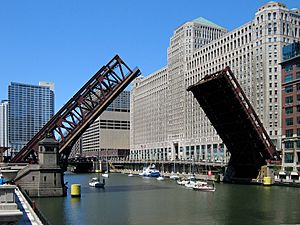Wells Street Bridge (Chicago) facts for kids
Quick facts for kids Wells Street Bridge |
|
|---|---|

Wells Street Bridge raised to allow sailboats to pass
|
|
| Coordinates | 41°53′15″N 87°38′02″W / 41.88750°N 87.63389°W |
| Carries | Automobiles Elevated Trains Pedestrians |
| Crosses | Chicago River |
| Locale | Chicago, Cook County, Illinois |
| Official name | Wells Street Bridge |
| Characteristics | |
| Design | Double-deck, double-leaf bascule bridge |
| History | |
| Designer | E. H. Bennett |
| Opened | February 11, 1922 |
The Wells Street Bridge is a special bridge over the Chicago River in Chicago, Illinois. It was built in 1922. This bridge connects two important parts of the city: the Near North Side and "The Loop." It is known for being a bascule bridge, which means it can open up to let boats pass underneath.
Contents
About the Wells Street Bridge
The Wells Street Bridge is located just east of the Franklin Street Bridge. It is also southeast of a very large building called the Merchandise Mart. This bridge is a vital link for people and trains moving around Chicago.
What is a Bascule Bridge?
A bascule bridge is a type of movable bridge. It has a counterweight that balances a span, or "leaf," as it opens. This allows the bridge to lift up, like a seesaw, to create space for boats to go by. The Wells Street Bridge has two of these "leaves" that open.
Carrying Cars, People, and Trains
What makes the Wells Street Bridge extra special is that it carries more than just cars and people. It also carries elevated trains! These trains are part of Chicago's famous "L" system. This means the bridge has two levels: one for cars and pedestrians, and another higher level for trains.
A Double-Deck Design
Because it carries both street traffic and trains, the Wells Street Bridge is a double-deck bridge. The lower deck is for cars, trucks, and people walking. The upper deck is for the Chicago Transit Authority's "L" trains. This design helps manage the busy traffic in the city.
When Was it Built?
The Wells Street Bridge officially opened on February 11, 1922. It has been an important part of Chicago's transportation system for over 100 years. It helps connect different neighborhoods and keeps the city moving.
Images for kids
 | James Van Der Zee |
 | Alma Thomas |
 | Ellis Wilson |
 | Margaret Taylor-Burroughs |


